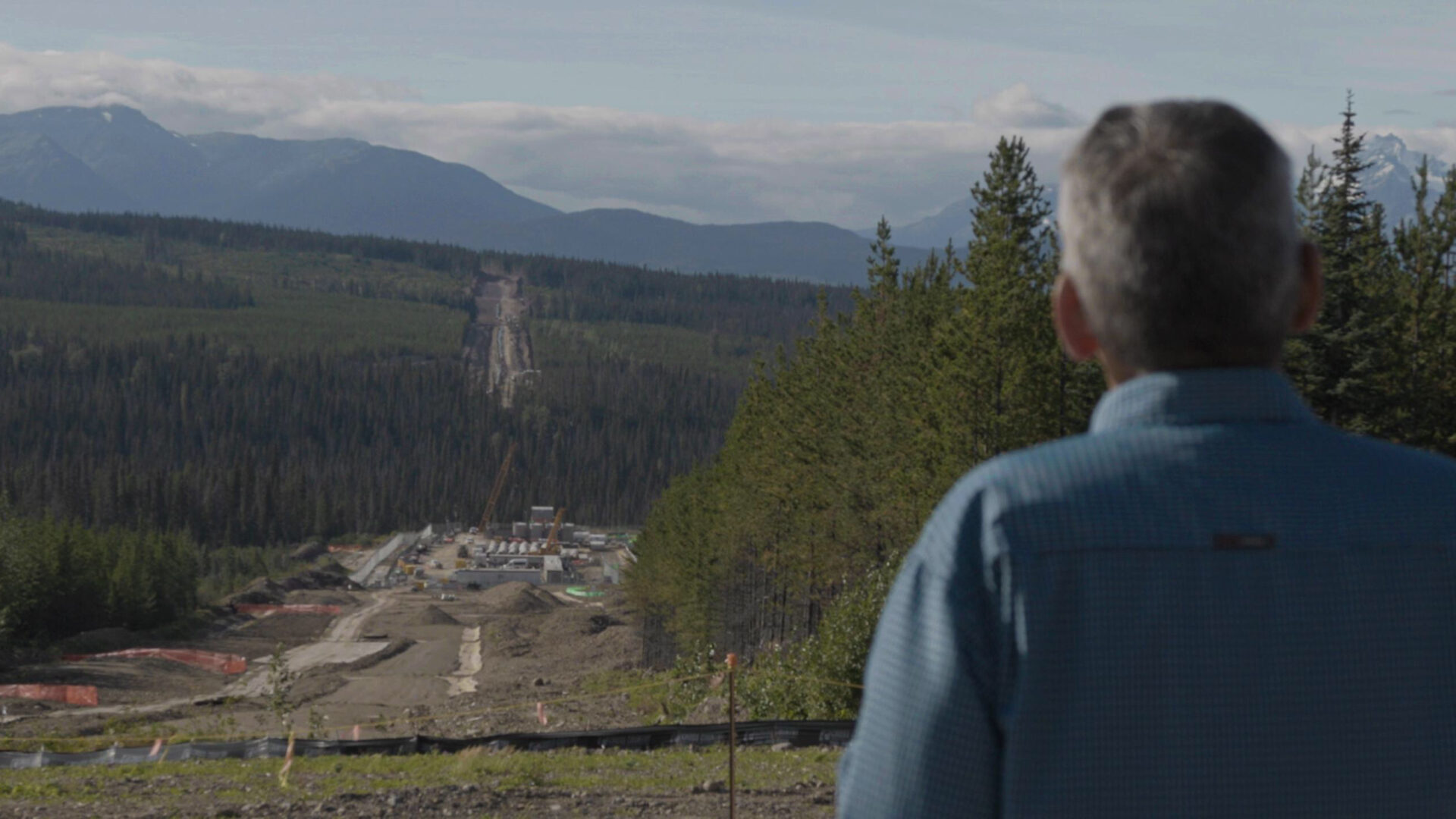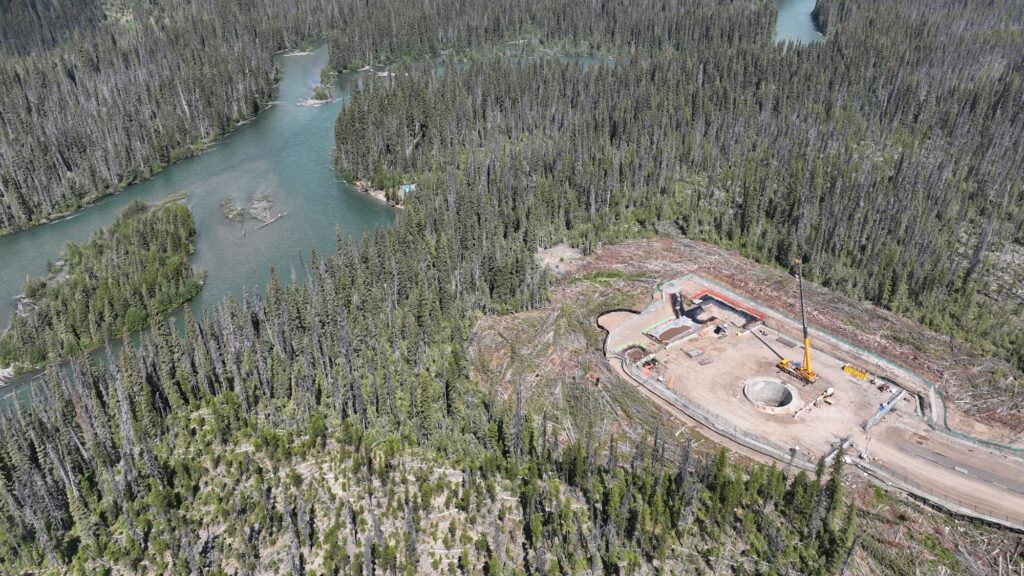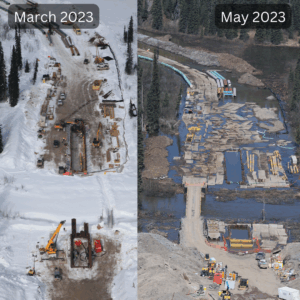
“Our Land, Our Law”: First Nation Leaders Demand Accountability for Human Rights Violations Fueled by Japan-Funded LNG Canada Project
Wet’suwet’en First Nation hereditary leaders filed a formal complaint against the Japan Bank for International Cooperation (JBIC) for financing LNG Canada, a massive fossil gas project that depends on a pipeline built without their consent, on their unceded land. Despite these violations, the project was completed and recently began commercial operation.
On July 17, Wet’suwet’en First Nation hereditary leaders filed a formal complaint against the Japan Bank for International Cooperation (JBIC) for financing LNG Canada, a massive fossil gas project that depends on a pipeline built without their consent, on their unceded land. Despite these violations, the project was completed and recently began commercial operation.
The Wet’suwet’en hereditary leaders accuse JBIC of violating its own environmental and social guidelines. In 2021, JBIC approved up to $850 million USD in financing for the LNG Canada export terminal through Mitsubishi Corporation. The project relies on the shipment of gas through the 670 km Coastal GasLink (CGL) pipeline, which was constructed through Wet’suwet’en territory on their unceded land without their Free, Prior, and Informed Consent (FPIC). The LNG Canada project then converts the gas into liquid for shipment overseas.
Sovereign Rights Denied
JBIC broke its own rules. By financing LNG Canada, it backed a gas project built on indigenous land without FPIC. That is a clear violation of JBIC’s environmental and social guidelines, and international law.

The Wet’suwet’en Nation never agreed to the CGL pipeline. Their hereditary chiefs, recognized by Canada’s Supreme Court, govern unceded territory far beyond small reserves. But JBIC looked the other way.
Instead of respecting Wet’suwet’en law, Canadian authorities signed deals with elected band councils created under the colonial Indian Act. When the hereditary chiefs issued eviction notices, police raided their land.
In 2020 and 2021, the Royal Canadian Mounted Police (RCMP) stormed Wet’suwet’en territory with rifles and helicopters. Chiefs, matriarchs, and land defenders were arrested. Journalists were detained. In 2025, a British Columbia court ruled the RCMP’s actions were “grossly offensive, racist, and dehumanizing.”

JBIC admits the LNG Canada terminal depends on the CGL pipeline, making it an “associated facility” under its own rules. By financing the project without properly addressing the pipeline’s harms, JBIC became complicit in rights violations and environmental damage.
Environmental Destruction and Climate Harm
The CGL pipeline and LNG Canada terminal have caused, and continue to cause, extensive ecological destruction across Wet’suwet’en territory. The 670-kilometre pipeline cuts through old-growth forests, wetlands, and salmon-bearing rivers. Since construction began, it has repeatedly violated provincial environmental standards.

The British Columbia Environmental Assessment Office (EAO) has issued numerous non-compliance orders against CGL for failing to control erosion and sediment. These failures directly damaged fish habitat and riparian ecosystems. Since 2022, the project has been fined ten times, totaling $1.4 million CAD. These are not isolated violations. They are part of a systemic pattern that undermines the Wet’suwet’en’s constitutionally protected rights to land use, resource sovereignty, and ecological stewardship.
The climate harm is equally severe. The LNG Canada terminal will emit millions of tonnes of greenhouse gases every year with no credible net-zero pathway. It relies on methane-heavy fracked gas, one of the most dangerous climate pollutants. Over a 20-year period, methane traps more than 80 times the heat of carbon dioxide, making its impact especially dangerous.
This project isn’t compatible with climate goals. It directly contradicts the International Energy Agency’s finding that no new fossil fuel infrastructure can be built if we are to stay below 1.5°C of warming. JBIC may frame LNG Canada as a climate solution, but in reality, it’s locking in decades of emissions and deepening the crisis.
Wet’suwet’en call on Japan to stop financing LNG and mitigate harm
In their formal complaint, the Wet’suwet’en hereditary chiefs lay out four clear demands to JBIC. First, they call for the immediate suspension of all further disbursements related to the LNG Canada project and a halt to any financing for future expansion. Continuing to fund a project that has moved forward without Free, Prior, and Informed Consent and in direct violation of Indigenous rights and environmental protections would deepen JBIC’s complicity.
Second, they demand a full and transparent reassessment of the project, including the Coastal GasLink pipeline, which JBIC failed to properly review despite its central role in making LNG Canada operational. This reassessment must include a meaningful evaluation of environmental and human rights impacts, particularly those raised by Wet’suwet’en governance.

Third, the chiefs urge JBIC to engage directly and respectfully with Wet’suwet’en hereditary leaders, who are recognized under Canadian law as the rightful decision-makers on their lands. That engagement must include steps to mitigate harm already caused, including the restoration of damaged ecosystems and support for Wet’suwet’en self-determination.

Finally, they demand public disclosure of the assessments, risk categorization, and decision-making rationale that led JBIC to finance LNG Canada in the first place. Transparency, they argue, is the foundation of any public accountability.
These demands are grounded in JBIC’s own environmental and social guidelines as well as international human rights standards. Meeting them is the minimum required to begin addressing the damage already done.
Japan’s Legacy of Harm with Fossil Fuels.
LNG Canada is not an isolated case. JBIC is the world’s largest public financier of LNG export infrastructure. Since 2016, it has provided $18.6 billion USD in fossil gas finance, enabling projects that displace communities, damage ecosystems, and accelerate the climate crisis.
In the Philippines, communities have filed a formal complaint against JBIC for its role in financing an LNG terminal in Batangas Bay. The project threatens to destroy coral reef systems known as the “Amazon of the Oceans,” putting the livelihoods of more than two million coastal residents at risk.

In Mozambique, JBIC helped finance a massive LNG terminal led by TotalEnergies in Cabo Delgado, a region already destabilized by violence and militarization. More than 550 families were forcibly displaced to make way for the project, which has been linked to increased insecurity, militarized repression, and human rights abuses.
In the United States, JBIC-backed facilities like the Cameron LNG terminal in Louisiana have experienced hazardous leaks, while an explosion at the Freeport LNG facility in Texas led to major evacuations and months-long shutdowns, underscoring the dangers these projects pose to surrounding communities.
Despite these harms, JBIC continues to approve financing for new fossil gas projects across the globe. Communities from Canada to Southeast Asia are left to bear the risks, while Japan reaps the returns.
A Moment of Truth for Japan
JBIC-backed infrastructure has displaced communities, intensified conflict, undermined Indigenous rights, and worsened the climate crisis. This model of fossil finance is facing growing resistance, and that resistance will only intensify.
The Wet’suwet’en hereditary chiefs have made their demands clear. Japan must not finance the expansion of LNG Canada, and JBIC must take immediate steps to mitigate the harm already caused.
Anything less would confirm JBIC’s complicity in a project built on dispossession, violence, and climate destruction. The Wet’suwet’en resistance is not going away and neither is the global movement demanding an end to fossil fuel finance.
Read the Press Release.
Featured photo: Wet’suwet’en Chief Na’Moks looking out at the destruction caused by the CGL pipeline


